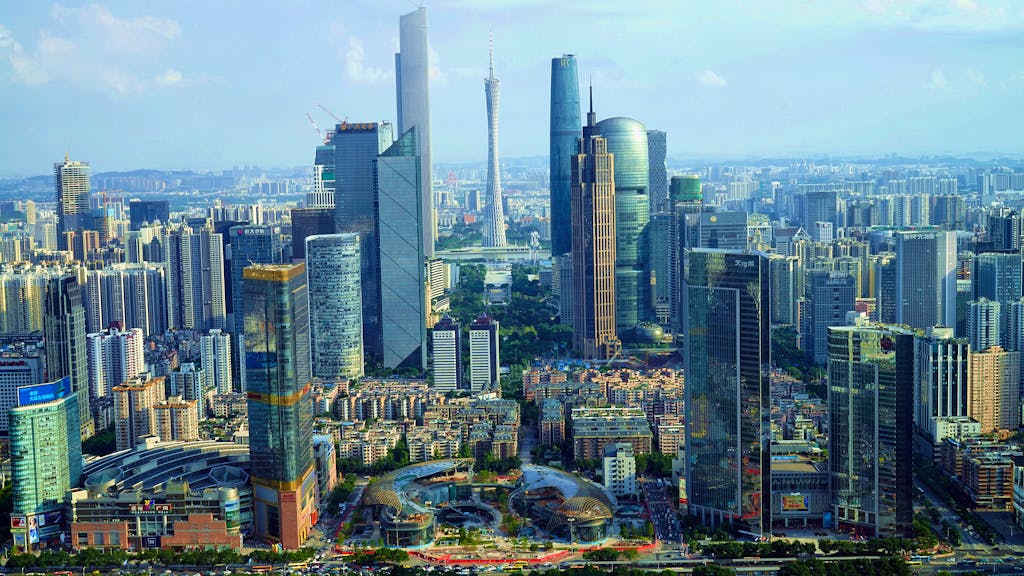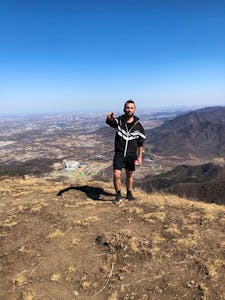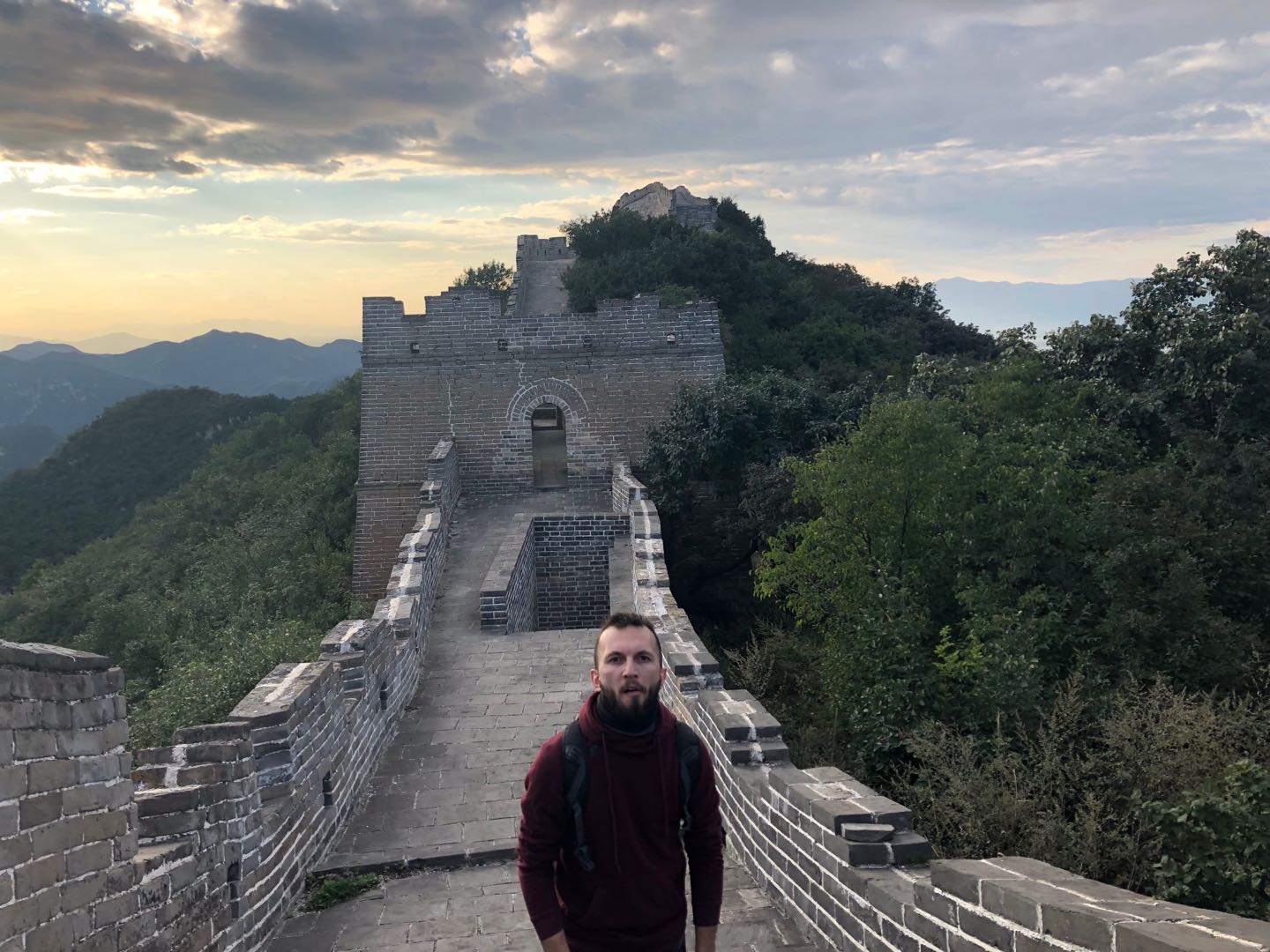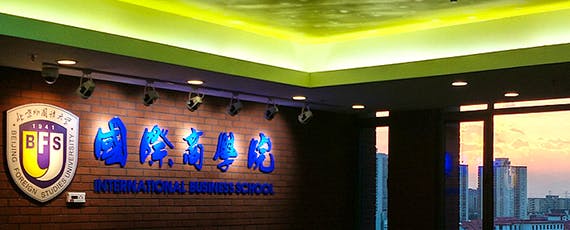At first glance, you’ll know that Ostap is an easy-going and happy-go-lucky guy who likes adventures and chilling with friends. In fact, during the interview, he talks about his love for hiking, and how the mountains of Beijing impressed him.
Behind Ostap’s carefree personality is a smart professional who has a lot of opinions and thoughts in mind. In this interview, Ostap shares how he accidentally first step foot in China, his struggles as an international student, how he ended up in BFSU and why he thinks he might have ended with the best job ever.
Read from start to end, and find out if Ostap is staying in China for good, or not!
Saina: Hi Ostap, can you please introduce yourself?
Ostap: My name is Ostap, I’m from Ukraine. What is important to tell?
Saina: Why did you decide to study in China?
Ostap: I came to China first more than 5 years ago. So I came to Guangzhou, in Guangdong province, which is in the southern part of China. That was in 2012. And at that time, I worked in this national student’s organization and we dealt with different students. We organized their stay in Ukraine and we helped with their traveling. I really had a good time.

After that, I wanted to do some volunteering. I wanted to do something that would really be different from all the countries that I’ve been to before. It just happened the way that I found this program in Guangzhou in China and it was about environmental protection.
Saina: Can you tell me more about your volunteering program?
Ostap: Yes, I found this program and it worked really fast.
Saina: How did you find the program?
Ostap: Basically, this mass organization is called ICEC.
Saina: I-C-E-C (spelling it out)?
Ostap: Yes, right. They have this website, I don’t know, they probably have it now as well. Through this website, you can look for different internships all over Guangzhou, so I used the website and I found a job. I contacted them directly, and so they were kind of based in the university, we had an interview and they instructed me so I went there.
Saina: What did you do in the volunteering program?
Ostap: Basically we were just organizing different lectures and activities for students of high schools and universities about the environment. We also had a team of foreigners from different countries. We did that in Guangzhou and the other cities of Guangzhou province.
Saina: How was it? How was your experience?
Ostap: It was really nice. I liked it. In the beginning, it was a bit difficult because I arrived earlier than the other guys before the program started and there were some problems. It was my first time so far away and I mean, I didn’t speak a word of Chinese at that time. The beginning was a bit tough, but then when I met my colleagues and we started working together. It was actually quite nice.
Saina: Do you think it was difficult because not a lot of people spoke English?
Ostap: No, actually, I think the problem was because of the universities and schools, I think those people could actually speak.
Saina: How about outside of your volunteer work?
Ostap: It’s still like that, I live in the southern part of the city, you need to speak Chinese there, Fookien Chinese.
Saina: How long was your volunteer work?
Ostap: That was for more than half a year.
Saina: Half a year?
Ostap: Yes
Saina: Did you went back to Ukraine?
Ostap: No, I started learning Chinese.
Saina: Did you study Chinese immediately?
Ostap: No, I went back to Ukraine for a few months and then I returned. I started studying Chinese and I also worked.
Saina: So you came back to China to study Chinese?
Ostap: Yes, and also my parents, they have a business. They kind of sell stuff made of wood. So they are interested in bamboo, they do bamboo flooring. This bamboo flooring, you need to get it in Guangzhou. I was also helping them. So it was also like a business experience, looking for vendors, buying and helping ship to Ukraine.
Saina: Was it hard?
Ostap: Yes, it was hard. I didn’t really like it, but it was a good experience. That time, I saw how I really needed Chinese and it was not easy, but I can also say it was successful.
Saina: For how long did you study Chinese?
Ostap: I studied Chinese for a long time. I studied Chinese for a year in Guangzhou and then also in Beijing when I had some Chinese classes.
Saina: Did you come back to China to Beijing or Guangzhou?
Ostap: I came back to Guangzhou, so I still live in Guangzhou and study Chinese there. Then I applied for Masters in Beijing and that’s when I used the website.
Saina: Can you tell me about your experience with this website?
Ostap: I think at that time, it was still developing.
Saina: In 2014?
Ostap: That was 2015.
Saina: Okay
Ostap: Yes, the beginning of 2015. I studied Chinese before, but my Chinese was not so good to study at a university and at that time, I was trying to look for programs in English. I think that’s what most people do when they use the website.
Saina: How did you find the website?
Ostap: Basically, I was just looking for programs in English and I found universities that were on the website. I found them myself just by searching. I have never heard it before. It just happened randomly, I just found it.
Saina: Did you applied through the website?
Ostap: Yes, I applied and it was actually quite nice. It was a clear process, I got all the documents and I applied through the website. It all worked out. I cannot complain, it was fine.
Saina: What about your MBA program? Are you taking up masters?
Ostap: Yes, it’s Masters in International Business.
Saina: Can you tell me more about your university program?
Ostap: I’m in Beijing Foreign Studies University. It’s basically languages, the university is famous for languages in China, but the university also has an international business school which is a new thing.
I think this international business school is quite successful, it’s much bigger and they have lots of programs now, they have foreigners and Chinese students. They also have a lot of exchange programs. Every semester, we would have many foreign students who would come all the way for one semester to two semesters.
Saina: Were there a lot of exchange students?
Ostap: Yes. Mostly they were from West Europe because I think most universities have cooperation. Exchange students come from France, Switzerland, and Germany. There were also students from Belgium, from the Netherlands but mainly some of them were also from different countries, but most of them were from West Europe.
People who studied with me full time, especially the bachelors, they were mainly from surrounding countries. Like Korea, Indonesia, and guys from Central Asia like Kazakhstan, mainly these countries.
The exchange students were also like masters students, mainly from Europe. I have a good experience out here because I have a diverse group. So I have a guy from France, I got from Russia, from India, guys from Indonesia, many of that.
Saina: Do you have many friends? Did you meet a lot of people around BFSU?
Ostap: Yes, definitely. I think the best thing about the program is not working while studying. Personal relations are important and I really met lots of interesting people there and also lots of people who are coming for one semester or two semesters.
These people are the most interesting because they have a choice of where to go. They could go to Japan, to the States, to Singapore or in China. Not everyone would choose Beijing for their studies or for the semester so most of those people who chose Beijing are different in their own countries.
They are not average people there and most of them are really interesting, it was really nice. Every semester, I would meet people who were really cool and we all still have a great relationship. Probably, that was the best thing about the program.

Saina: Did you ask them why they decided to come to China?
Ostap: Yes. The first thing is that China has the second-biggest economy. It’s still growing and it’s better to know more about China than less. I think it’s the main driver why people choose to come here. They think it’s important for their future career, that they have experience of living here and I think it is important.
Even if you don’t speak Chinese, it’s different when you come to China and be here half a year or full year like to experience how it is here. It’s really very good.
Example, I’m from west Ukraine, if I go to Sweden or Portugal, or to Ireland. I talk to people there and I’ll be so different to people from those countries. There will be lots of things like we’re just so different. If I meet anyone from Europe, any country in Europe, in China, we have way more things in common just because our cultures are way closer.
In reality, when you only live in Europe, you think that it’s so different, but if you compare to China it’s just different levels. It’s made more difficult to get along with people who have a Chinese culture.
Saina: Yes, it’s definitely a different culture.
Ostap: Yes, even if you meet someone from Latin America, like from Argentina, which is really far, they still have a closer culture like what you’re used to comparing to China.
Saina: You’ve been studying here 2, 3 years, right?
Ostap: I studied for 2 years.
Saina: All right, 2 years. How about other students? Did you had Chinese classmates as well?
Ostap: Yes, I had Chinese classmates.
Saina: Was the networking good?
Ostap: It was nice. I mean, I like my classmates. We have different classes with different people so we weren’t always together. Like in my front room, it was like a master’s problem so we were around 10 people, all of us foreigners. All of us had the same classes. But there were lectures or particular classes where we were with Chinese people.
I did have good relationships with my Chinese classmates, I like them. The cultures are different, but I really liked them. There were no problems.
Saina: Did you have any expectations about China prior to coming here?
Ostap: I guess so. Actually, I never thought that I’d stay here for so long. I never even thought that I would be here.
Saina: How long have you been here?
Ostap: I’ve been here for more than 5 years, that’s a long time. I definitely did not think that I would be living in China for so long. But it just happened here, because it’s true that there are opportunities here. Example, the job that I’m having now here, I probably would never have this job in any other country.
Saina: Can you please tell me more about your job?
Ostap: I work in a security company now. I deal with security solutions. We design different security solutions for surveillance, or premature protection of important objects, for lifelines, cyber security and so on.
It’s a very big company, the company is part of Tsinghua Holdings. Tsinghua Holdings is a huge corporation. The company has 6 big clusters and they are in different fields. Chips for example, with health, education and one of the companies are working on security. We are still part of Tsinghua holdings.
They have lots and lots of projects in China and they’re also expanding abroad. We have projects in Ecuador, in the Philippines, Singapore, and many other countries.
The company wants to expand more and more, mainly in developing countries. Because China, especially now, when there’s an issue between the U.S. and China, it’s more difficult to enter developed countries.
Saina: After your masters, did you immediately get this job?
Ostap: Actually, almost yes.
Saina: So it was easy? Because I also graduated with a masters course and I’m trying to find a job… I don’t speak Chinese and it’s really hard to find something, without Chinese.
Ostap: I think when you’re a foreigner and you look for a job in China, in my opinion, English is an advantage. Even though definitely when you speak Chinese it will be easier to find a job, even if your Chinese is not perfect. I think they expect you to speak Chinese, but in my work, I use mostly English. When we have meetings, we mainly use Chinese.
Saina: How about your colleagues?
Ostap: Well, it depends. Some colleagues only speak English and others speak only Chinese, so it really depends.
I actually didn’t stay in China, it just happened that way. My offer was in Russia, but I think it’s better for me to stay in Beijing because I think it will not be easy for me to move to Russia and Ukraine. The political situation is not so good right now.
That’s why I was looking for a job and I only heard randomly in the job fair in Beijing Foreign Studies University. I went to the job fair, printed my CVs and applied for around 6 to 7 companies. That was the only company that replied.
Saina: Oh, really?
Ostap: Yes, so I went to the interview and it went well, then I returned after a week to the company.
Saina: How long have you been with the company?
Ostap: More than a year, like a year and a half.
Saina: Were you looking forward to going back to Ukraine after your masters?
Ostap: Yes
Saina: What are your future plans?
Ostap: It was good for me to stay here because I’m getting a great experience, which is very interesting.
For anyone who wants to get a job in China after graduating, the most important thing is to apply personally, not only online. In China, personal relations or human contact is very important.
Looking online is also important because you have a lot of choices, but you still need to go to job fairs. In my experience, it really helps. Just bring your CV and apply to companies that you like. It’s definitely possible.
Like my friend, she’s already in her second job. She found her first job and it was in art, but the company had lots of problems and it finally collapsed. It was not that good, but it was also a good experience for her. Then she found another job, so it’s definitely possible.
Saina: You said you found your job in a job fair, didn’t you use any website?
Ostap: I used, but I still went to the job fair and it worked out. If not, I would have used more websites, but my friend used websites. She found all her jobs through the websites.
Saina: Which websites did you use? I only used LinkedIn and JingJobs.
Ostap: Yes, but there are many. LinkedIn is good but it’s not the best thing in China, many companies don’t use it.
Saina: Yes, probably. I only know of JingJobs.
Ostap: Yes, I heard of JingJobs, but there are definitely more. I cannot remember, she used a few, not only one website. It’s better to use a few because sometimes they don’t reply and check your application.
Saina: What are your future plans?
Ostap: I’d like to study MBA.
Saina: MBA?
Ostap: Yes, but for that, I also need experience because I’m not ready to stay in China for a long time. I don’t think I’d be happy living here, being a foreigner is not easy.
Saina: After 5 years, you still think that staying in China is not for the rest of your life?
Ostap: No, absolutely not. I mean, I have a good life here, I can’t complain. I have a lot of friends here, I travel and it’s all fine. I have no serious problems.
Saina: A lot of people say when I ask them, for example, they’ve been here for 7 years and I ask them “what are your future plans, do you want to stay here for the rest of your life”? A lot of people say no, for a few years, but not forever.
Ostap: I think it’s normal. Not all people know what they want to do with their lives. I don’t really know what I want to do 100% but I want to do MBA.
Saina: Are you planning to study an MBA here in China?
Ostap: No, not here in China. When you’ve studied for a long time here, I think the Chinese education system in universities is really that good, especially if you don’t speak Chinese. I mean, they also have problems.
Saina: There are also English MBA programs here in China.
Ostap: Yes, absolutely. I’m aware that there are English programs, but the problem in universities is also a factor if you want to stay here in China. For now, I don’t want to do it here, I’d rather do it abroad, but I don’t mind coming back to China one day and work here again. I definitely want to have a break.
Saina: Do you mean a “break” from China?
Ostap: Yes. I think it’s really difficult to plan your life here because there are a lot of things that don’t depend on you.
For example, buying in department stores in Beijing is not possible. It’s one of the most expensive cities like the prices here are similar in London. It’s not going to change because the Chinese population is so big and Beijing is the capital of China.
Even if it was possible, I would not really buy because I don’t think Beijing is not a good city for life. If you’re not young or looking for something, it’s not a good city. If you’re not ready, Beijing is a good place. It really doesn’t matter.
Saina: You mean if you’re young…
Ostap: I mean if you’re really young and you have the energy, it’s a good city. If you want to have a family, for example, it’s not a good place. If you want to get out of the city, it takes a whole day because Beijing is so big.
Saina: Did you have any experience living in China?
Ostap: What kind of experience?
Saina: Life experience.
Ostap: I have lots of experience in China. I traveled so I’ve been to many places in China. Well, what other experience… at work now, there are a lot of things that you kind of has to get used to.
Normally, at 12 o’clock, people have lunch and until 2, nobody works unless they have issues that need work. They eat lunch around an hour or maybe less, and after people take naps or play on their phones.
Sometimes, they just watch videos, but normally nobody works. This is something that’s different in Ukraine, so you have to get used to this. I’m trying to go to the gym now at this time because I can’t nap.
Saina: Is the lunch break for two hours or one hour?
Ostap: No, it’s only one hour but nobody cares. It’s socially acceptable, it’s like that in China in many things. There are lots of things done that should not be legal like smoking in public, but in reality, nobody cares.

Like scooters, they don’t follow rules on the road. There are rules, but nobody cares, so there’s no enforcement. It’s something like that.
For many people, like those who work in my company, there are a lot of smart people working there, but there’s a problem. It’s difficult to see the key problem, so you have to prepare a project or whatever.
People attempt to propose on little issues, but like the company doesn’t see the key points and I think because of this, it’s more difficult sometimes to work with my colleagues.
But I have a lot of other experiences. I like hiking and their mountains like the north and west of Beijing… If you’re in Europe, and you like to hike and you have a backpack or something, it’s super easy to go to their mountains and you hike. In China, there are a lot of places that are closed to the public, especially if you’re a foreigner so you can have lots of issues with this.
I had this experience and we wanted to get to this beautiful mountain. It was in the national park and they didn’t let us hike, even if nobody really hikes there, but some have a pass because they did it before.
The first time I went to that mountain, it’s in the west of Beijing was in April. There was snow at the summit at that time, and many parts of the mountain had snow so when we got there, we decided not to go to the summit because we didn’t have the proper equipment and it’s not really safe. It was an amazing place, it’s much cleaner, it’s nature and it’s just beautiful.
We could enter the place, and we arrived really late. We arrived at the foot of the mountain at 9 p.m. It just happened we were late, so nobody was there. Then we went down, and there were no problems.
The next time we got there, the same year in October, we had more people and we arrived early because I already knew where to go and we arrived at around 6 p.m. and there were guards. We asked and we tried everything, but they called the police, and the police arrived.
Saina: Was it because you were late?
Ostap: No, because we were foreigners and we weren’t allowed to hike there.
Saina: Was it because you were foreigners?
Ostap: I don’t know why they didn’t let us but it’s so like China, that when you can sneak in when nobody’s looking after you’ve done it, nobody cares.
When we were going back the first time, there were also guards, but when we were going from the mountain, nobody cared because we already did it. That’s it.
But when we came the second time, they would not allow us. When Chinese police arrived, there’s nothing we could do. In any country, there’s just so much you can do.
Also, I never had this experience, but my friends have, when you fight with Chinese and they call the police you are always wrong. It’s not really fair, the whole thing.
If you go to the police station and there is a foreigner and a Chinese person, the foreigner is normally wrong. Many foreigners have to pay a fine, you get kicked out of work or out of the country.
Saina: I heard different, Chinese people are afraid to mess with foreigners. I heard something like that.
Ostap: Yes, probably many people do.
Saina: There’s this notion that if you’re a foreigner and you call the police, they’ll be on your side. Is this true?
Ostap: No, I have two friends who had drunk fights with Chinese people and they were always wrong, they had to pay the fine.
On the other hand, to be fair, if you compare foreigners, we tend to be a little aggressive. I come from an aggressive society, so it’s true if I compare people from Ukraine or Russia, people here in China and way less aggressive.
Normally, the person really has to be drunk or strange, I don’t know to have a fight. It’s really not a place where you have lots of fights.
Saina: I feel the same way. In Russia, you’re afraid to walk really late, like 11 p.m. Here in China, I don’t know but I don’t feel like that.
Ostap: Beijing is one of the safest places on earth. Not only because people are less aggressive, but because the security system is insanely good.
It’s true like the cameras are everywhere and they have this system, called call and dispatch system. They can call a taxi or a bus and they have a security kit. I know it because I’m also working on these things.
These security kits include a few cameras, normally in Beijing, they have 5 or 6 cameras. For taxi, normally 2 or 3 cameras.
Saina: Can you explain a bit more?
Ostap: Yes, they always record stuff that’s happening inside the vehicle. Also, there’s a server that stores data, the GPS locator and the security and alarm button. The alarm button is usually located under the driver’s seat. You normally don’t see it.
So, when there’s a fight happening inside the bus, any crime or whatever, the driver can press the button and the command center of the district of Beijing will get the signal from that particular bus and the GPS locator gets activated right away and the location of the bus gets located.
The cameras get activated so they know what’s happening inside the bus. Right away they dispatch or send the police, medical personnel or whatever is needed to that place. It’s pretty advanced in many ways.
Saina: Yes, it’s really true.
Ostap: If anyone steals, or like there’s any serious assault since China is still a totalitarian country, I don’t know what they do with these people, but I know what’s happening in Xinjiang.
Saina: Okay
Ostap: The world here works in different ways. In terms of security, it’s a very secure place. If you don’t do anything bad, you will be considered good in China.
Saina: What about people in your country, do they have misconceptions about the Chinese or China?
Ostap: Yes, I think they have a lot. Lots of people see China as a communist country, and because of that, local people I guess don’t have an interest to come, which I think is not really fair.
Of course, it’s a communist country but in reality, it’s only communist from the top. The economy works completely in a remarkable way. Many people don’t understand how advanced China is in many things.
On the other hand, it’s also not advanced in a lot of things. Like in Ukraine, many people are now moving to the west, and the east is less interesting. There’s definitely less interest to China than to the United States, for example. It’s a big difference.
If there’s a chance they can go out of the country, like in China or European countries, they would definitely choose European countries. Well, there might be some who will choose China, but they will be a minority.
There’s definitely a problem. I think you can go to China from Ukraine through Russia? This is because of history, but it’s really not like that now. Things are changing, and the world is changing.
From both sides, there are stereotypes, and it’s not too good. It has to change at some point.
Saina: If you had a choice before, between China and other countries, would you still choose China?
Ostap: For what, for like for work?
Saina: No, for your studies.
Ostap: I would not choose China. I chose China because I was already here learning Chinese. I thought it would be good for me to not forget it and also because it was much cheaper.
But China would not be my first choice. In many ways, it’s also because before I came to China, I also had many stereotypes about the country. I was in many ways surprised when I lived here.
Saina: So you had stereotypes? When you came to China, what was real China like?
Ostap: Lots of people think that Chinese people don’t like to talk politics, which is kind of true, but it’s not completely true. Anyone can tell you whatever they think. It’s not like they’re terrified, like criticizing the government, it’s not true. Of course, people are different and there are lots of people who are less educated, who would be supporting the government but it’s like that in many countries.
If you’re a foreigner, you mostly interact with people who are highly educated and they understand that there are also problems in the country, lots of things can be better, can be different. It’s also because China is such a massive country with such a huge population. Any change here is slow and it’s normal.
I didn’t really expect to see as many skyscrapers here, and many cities are modern. The infrastructure is amazing, the bullet trains are probably the best in the world. You can get to any city in China with the bullet train and it’s really incredible.
It’s not that expensive and the subway in Beijing, Shanghai, and Guangzhou are just amazing. You pretty much can go anywhere by subway and it’s easy to use. It’s not expensive. buses are pretty great as well. The system is clear, it’s so fine.
On the other hand, like their skyscrapers, on the one hand, it’s nice but you can still see that it happened really fast here. Even though they have a lot of skyscrapers, often it’s not good for people who live in the city.
If you live in Europe, urbanistic ideas are very strong. They’ve made a lot of cities livable and comfortable for life, but in China, it’s very different.
For example, if you go to places like in Guomao, Beijing it’s filled with skyscrapers and if you want to just walk around, it’s not a comfortable place. It’s mostly for cars and normally, there are traffic jams. If you want to walk around, there are not many greens, it not a good place with friends.
In this part, China can do better, but because it’s not really important to the city government. They don’t really care too much.
On the other hand, there are also things that they try to do. They try to make the cities green at least. They try but I don’t think they try in a really good way. Like they put a lot of bushes along the roads which are not really nice, and it’s not a place that you would like to spend your time where you feel really comfortable.
It’s a big difference, you can plant a lot of trees but you should do it in a smart way. I don’t think there are a lot of places where you can be comfortable around Beijing.
Saina: Can you please give an advice to people who want to study in China?
Ostap: It’s great if you study abroad and come here as an exchange student. That’s probably the best, but if you can do master’s as I did, it’s also pretty good.
It’s also a good option because you don’t have to study here for too long. You can find programs for one year or two years, which is really enough to experience this life in China.
After the master’s, you can get a job which is possible in China. If you don’t have a bachelor’s and master’s in China, it’s way more difficult to find a job. But if you have a master’s and you get a job, it’s easier to get a work visa.
Saina: Do they require experience after your master’s?
Ostap: For Chinese Master’s, they don’t require experience for the visa, otherwise you have to have 2 years of experience outside of China. China can give you good experience and there are many interesting cities. They are enormous and big, and you can always find something for yourself.
Saina: Which city do you like most in China?
Ostap: Oh, it’s difficult to say, like with any other city.
Saina: I’ve only been to Shanghai and Beijing as well, so I don’t know.
Ostap: The city that impressed me the most is Chongqing, it’s huge there. There’s a peninsula with lots of skyscrapers and bridges.
Saina: Is Chongqing a new city or an old city?
Ostap: It’s an old city. It was the capital of China for 4 to 5 years after the second world war. The Japanese occupied the other cities, so the Chinese had to move the capital to Chongqing. It’s an interesting place, but not a place where I want to live.
It’s definitely as advanced as Shanghai and Beijing, so if you want to work, places like Shanghai offer more and you have more opportunities. But I think it depends because if the person is more interested in Chinese history, comparing Shanghai and Beijing, I would go to Beijing.
If it’s related to international relations, Beijing is definitely better. If you want a modern city, Shanghai is your place of choice.
Saina: What opportunities have you had in China?
Ostap: I would definitely not have a job in China if I didn’t study. I would not even think of looking for something in China, that’s true. But it gives you advantages, you also have to be ready to commit a few years of your life to study and work here.
It’s not easy, because many people, including myself, after studying here you kind of get tired somehow of China. I think I would have regretted it if I moved out after my master’s. It’s good that I stayed here.
Saina: I think that’s all. Thank you Ostap.
______________________________________
Special shoutout to Ostap for sharing his time and making us laugh during the interview!
If you would like to start your China adventure with ease, contact China Admissions and be on your way to pursue higher education in the sleeping lion of Asia – which has now awakened!
Learn everything about Beijing Foreign Studies University (BFSU) or the Masters in International Business program.
- China Scholarships – The 2025 Guide for International Students - December 30, 2024
- 9 Fascinating Things About Christmas In China - December 24, 2024
- 8 Apps To Learn Chinese Online For FREE in 2025 - December 4, 2024


